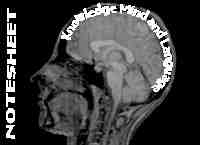 The
Status of Folk Psychology 1
The
Status of Folk Psychology 1
Steven Stich: Autonomous Psychology and the Belief-Desire Thesis: beliefs cannot figure in scientific psychology
Beliefs are not fully determined by brain state.
Same program, different interpretations
Programs on the PC to graph the prospects of (a) Mr Jo and (b) your shares may turn out to be exactly the same - only the output being interpreted differently.
"... [I]t is quite possible that two computers, programmed by entirely
different users for entirely different purposes, should happen to run
physically in parallel. They might go through precisely the same sequence
of electrical currents and flipflop settings and yet have their outputs
interpreted differently by their respective users." Lycan, Introduction
to Part V, Reader, 2nd edition, p.253.
This fact has been taken to mean that you can't really attribute beliefs to the PC. What comes up on the screen when the first program is run is a graph which is interpreted to mean 'The horse is going to lose a few races, but then come up smelling of roses'.
What comes up on the screen when the second program is run is a graph which is interpreted to mean: "The shares are going to dip before they move firmly ahead."
Although the state of the machine is the same in the two cases, it would surely be wrong to attribute the same belief to the machine no matter which program is running...
The conclusion that this supports is that the belief represented in a machine is not fully determined by the sate of the machine as it is representing it. The identity of the belief is partly dependent on context.
For the representational theorist, there is a parallel in the human case.
You can't think of beliefs as 'really' physical states in the brain that can be causally active in governing behaviour, as the representationalist theory insists.
END
Revised 24:02:03